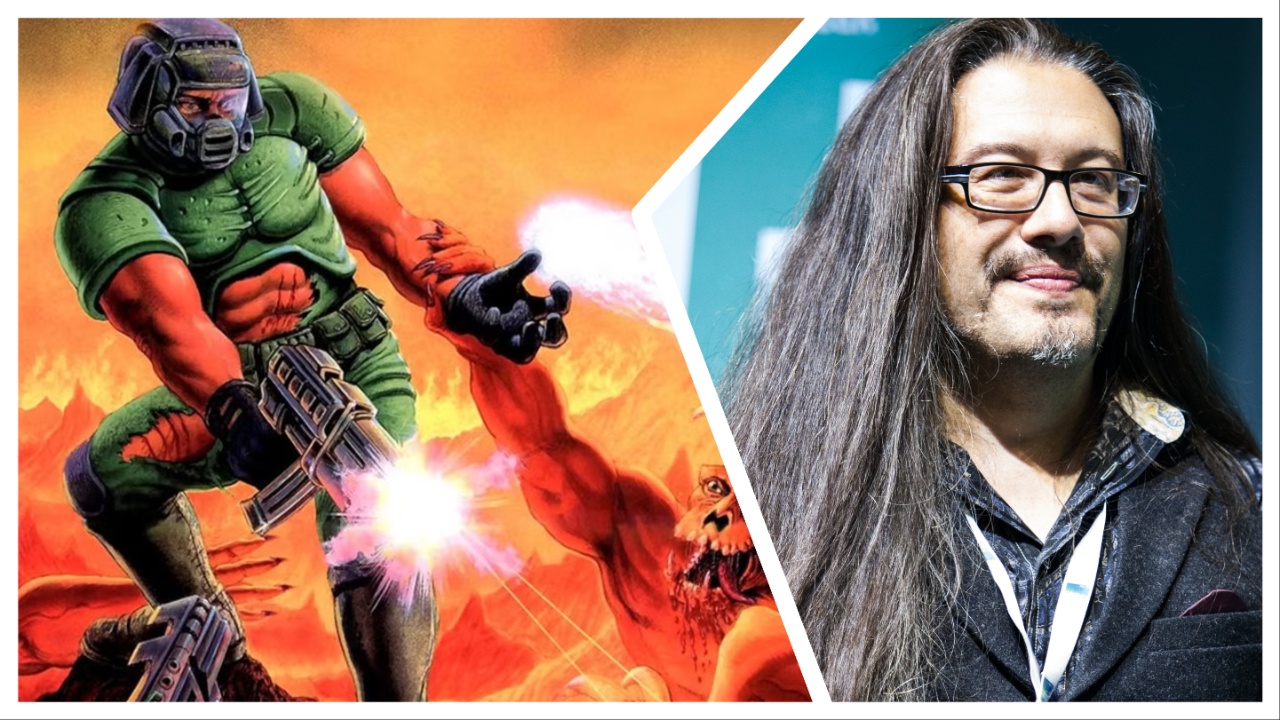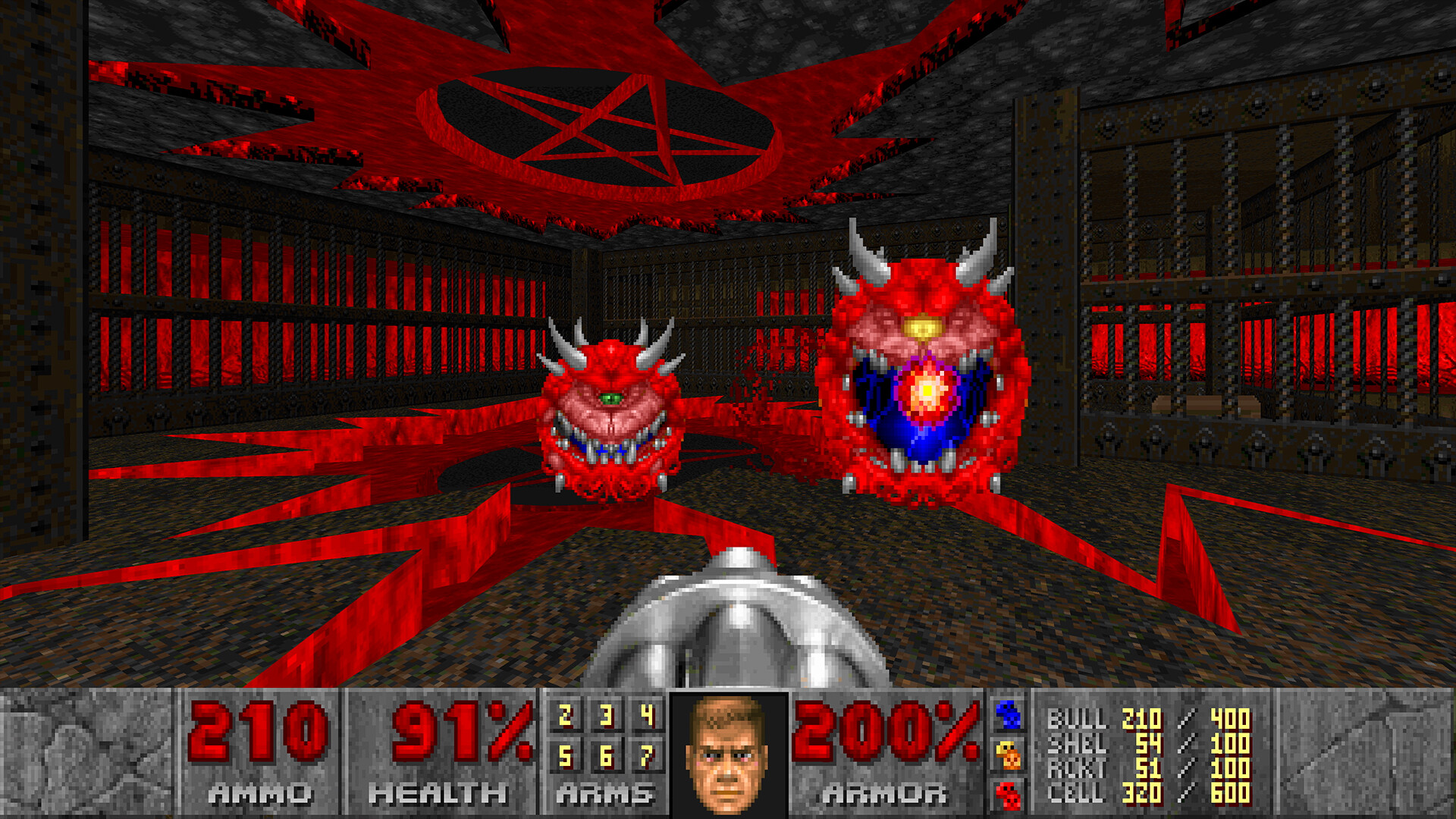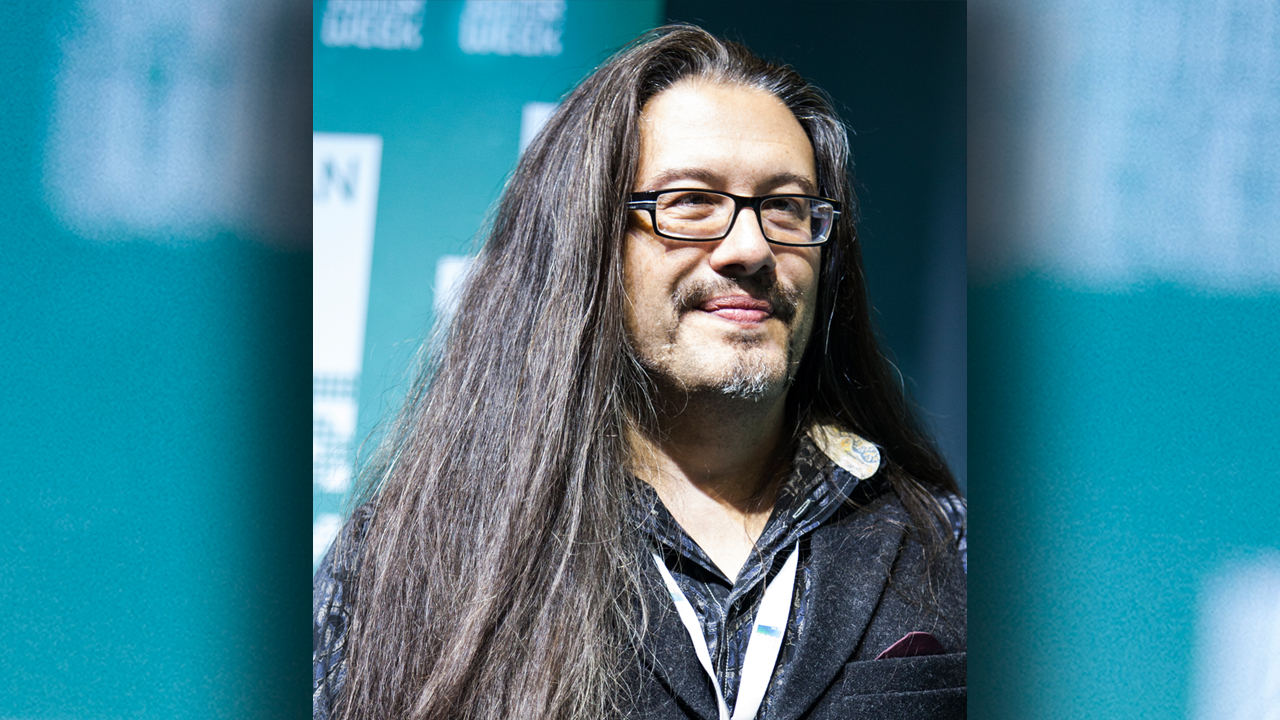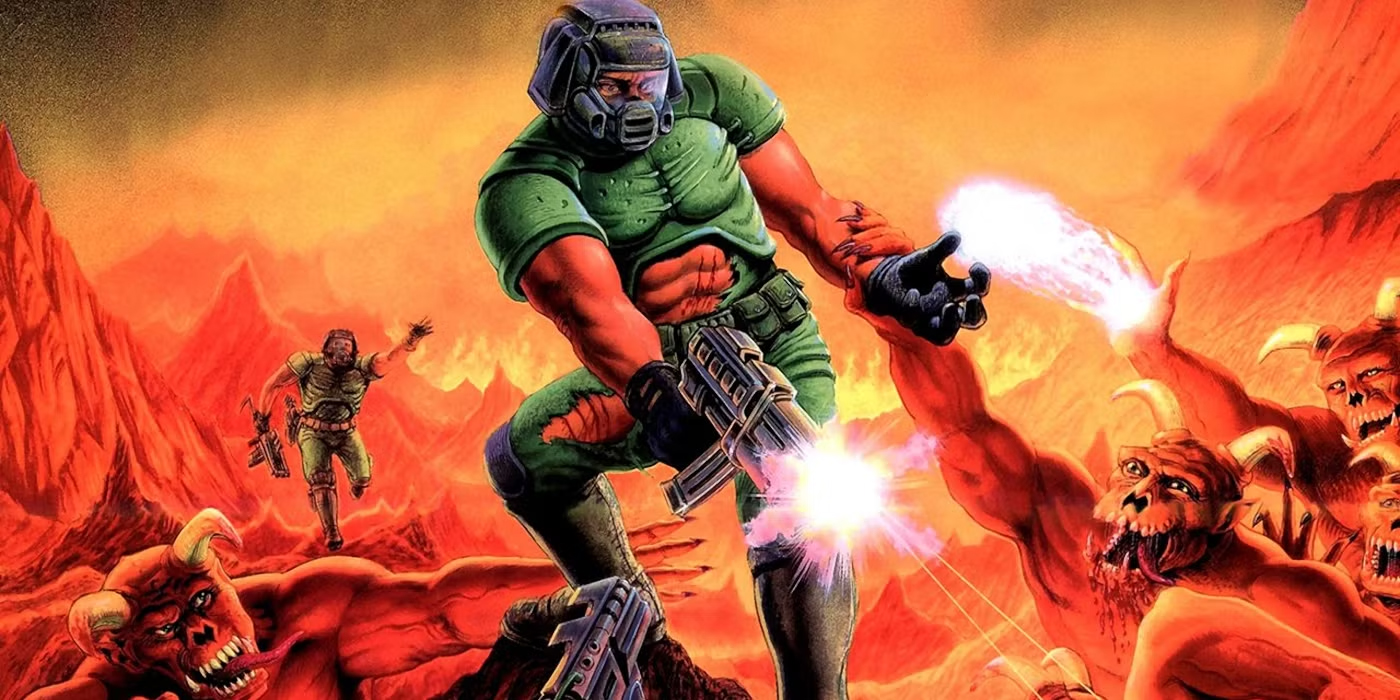
Whether you’re making a Tesla or designing a pregnancy test, there’s one sure fire technical test to put your creation through its paces – 1993 gaming classic, DOOM. Ported to everything from smart fridges to printers, the pioneering PC shooter’s become something of a meme, with “will it run Doom?” being asked of each new unnecessarily screen-filled appliance.
Now, however, Doom is running on something even more out there. “E coli” reveals Doom creator John Romero with a grin, “Doom now runs on e coli bacteria….” ID software’s seminal shooter has now become so influential that bacteria can boot it. Yet as Romero tells me from his home in Galway, Ireland, Doom almost didn't exist.
Back in February 1991, Romero and four friends banded together to make an anarchic new software company – ID Software. Unlike the monolithic corporate entities of Electronic Arts, ID’s informal Texas office felt more like a university hangout. Living next door to each other, these four 20 somethings spent their days laughing, coding and blasting metal late into the night, tinkering with game engines and pushing computer tech to its limits.

While Nintendo’s 16 bit SNES console offered vibrant colour and whimsical worlds, ID shocked the industry in 1992 by providing an altogether darker and more blood-soaked alternative – Wolfenstein 3D. Running at a blistering 70 frames per second and putting players in the never-before-seen first-person perspective, it was an exhilaratingly-violent technical marvel.
“We made Wolfenstein in four months," Romero recalls, “After Wolfenstein it was like, well, if you don't have a PC, your games suck! You can't do this on Amigas - not even a Super Nintendo can do this, everybody was just blown away by the speed.”
Yet the original plan wasn't for ID to make pioneering first person shooters, but to continue their long-running platform series, Commander Keen. Luckily for us, Romero and Co decided to take things in an altogether more demonic direction.

In January 1993, all eyes were on ID, as the Texan troublemakers announced their next first person shooter to the world – Doom.
Get exclusive shortlists, celebrity interviews and the best deals on the products you care about, straight to your inbox.
“We put out a press release that said, this is gonna be the best game in the world,” says Romero, “We expect worldwide productivity to drop when this game comes out. It's a revolution in PC programming, like all this shit that we put in… but we hadn’t even started working on the game!”
Thankfully for the studio and - and the world – ID’s seminal creation lived up to the wild hyperbole. As Romero and the ID team doubled down on digital darkness, Doom went on to change the trajectory of gaming forever, popularising the now inescapable first person shooter genre and laying the foundations for the community-led internet that we know today.
“Our aesthetic as a company, our design vision and how we want that to look on the screen, I think was inspiring to people.” reflects Romero, “We wanted developers to think that they can do anything on the screen, even if it was dark… even if it was crazy.”

Five Little-Known Ways that Doom Changed the World
1. ID Software’s punk rock ethos led to the creations of mods and moving the games industry forward
When a company creates a transformative new tech, they are normally just as quick to patent it – yet for the heavy metal loving Texan upstarts, commercialism was the enemy.
“We hated patents,” Romero explains, “ We would not patent anything. I came up with the word ‘deathmatch’, we came up with the word ‘frag’ for kills, but we didn't trademark those words, we wanted those words to be used in the industry.”
Yet it wasn’t just their words that Romero happily shared with the rest of the industry. “One of the other innovations was to make Doom an open game for modders to be able to create whatever they wanted.” Romero says.
"And then three years [after launch] we gave the source code out to the world. Our belief system was about sharing information and helping other people, because the more games that can come out, the stronger the industry gets.”
2. Without Doom, there’d be no Reddit.
Doom, Quake and ID’s approach to connecting players online has been surprisingly formative for the rest of internet culture. As Romero tells it, without ID’s 16-bit blasting, the world wouldn’t have Reddit.
“Reddit started because of Doom,” Romero reveals. “The origin story was these guys were just Doom nuts, and they decided to start this forum type thing. They had a different idea for a forum - very slash dot-y - before Reddit that was called Digg, [a message board] that covered everything. They all connected through DOOM. They were just friends who shared this love of this game and created it as a way for them all to chat and meet up.”
“Even in Ireland, there is a site called boards.ie. which is massive - it is the country's forum for any kind of information - that was started because of Quake.”
3. Doom, satanic? Mormons say ‘don’t panic’
Doom, unsurprisingly, drew criticism for its heavily demonic imagery in the ‘90s, but even at the time, Romero wasn’t worried.
“Satanic Panic happened 10 years before… D&D… Ozzy Ozbourne - all this stuff was going on in the early ‘80s.” recalls Romero.
“So when Doom came out, [Satanic panic] was already kind of old school. What were they gonna say about Doom? It's satanic? You're not a demon and you're not doing satanic rites, you are killing these things and sending them back to hell! Sandy Peterson, who actually worked on Doom was a practising Mormon, he wore garments to work and he's like, ‘Yeah, you're killing demons…’ we weren’t worried about what people were saying.”
4. When a horrific school shooting put Doom in the firing line
As the U.S struggled to come to terms with the horrors of 1999’s tragic Columbine school massacre, right wing pundits were quick to point the finger. Despite being set in a hellish depiction of outer space, Doom became the first video game to be blamed for real world violence. Yet while the ease of access to firearms was conveniently ignored by politicians, the killers’ love of artists like Eminem and games like Doom were instead brought into the spotlight, putting ID software in the midst of a sensationalist media controversy.
“It was a horrible, horrible situation,” reflects Romero. “We didn't make comments on it at the time, because it wasn't the time for it, but we knew that we were not the cause, someone who's sick did this - and we knew that's what it was. Millions and millions of people play Doom - and nothing like this has happened. We just avoided it, because it was tragic. We didn't want to say, ‘you have got to watch your kids. You've got to pay attention’…It's just that [those kids] had issues.”
5. Doom made Romero a heavy metal icon
With a frantic MIDI soundtrack who’s bloops and bleeps aped thrash metal classics from the likes of Metallica, Slayer and Testament, it’s little surprise that Doom's blood-soaked battle through hell became beloved in heavy metal circles. From the font to its demon designs, it’s still arguably the most metal video game of all time, with even 2016’s recent reboot wisely soundtracked by blisteringly down-tuned guitars. Romero tells me that GWAR are huge Doom fans, with Romero’s contributions to metal seeing him recently contributing to an official Iron Maiden book.
“Rammstein played Doom all the time,” Romero says. “We even got sent a cassette tape - I still have it - From Manny Carlos, guitarist of ‘80s metal band, Nazareth, as he wrote a song called blood on the walls, inspired by Doom - which is just so good!”
More famously, Nine Inch Nails’ Trent Reznor was besotted with Doom, leading to Reznor penning the soundtrack to Doom's beloved follow up, Quake.
“Downward Spiral was brilliant…just really creepy, so when Trent said he played Doom all the time, it was like holy shit! Trent’s home studio was also right next to Anne Rice, the novelist…so we were like, this is perfect!”
Now, over three decades later – Romero finds himself regularly rubbing shoulders with heavy metal royalty. “Recently in Ireland, There was a Black Sabbath concert. And Tony Iommi had set some tickets aside for us. We got our tickets and sat in the special section - and no one else was there, except for this guy who was in his 70s, next to us. I was pretty surprised, I said to him ‘I didn't know that you would like heavy metal?’ and he replies, 'I've never heard this music before. I'm Tony's best friend from when we were little kids and lived on the same street, I didn't know that he got to be so famous, or that he made this kind of music - and now, I get to hear it tonight for the first time.”
Image credits: Rosdiana Ciaravolo/Getty Images
